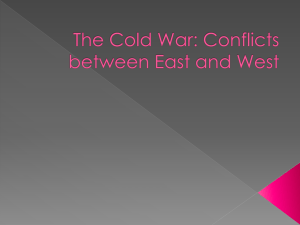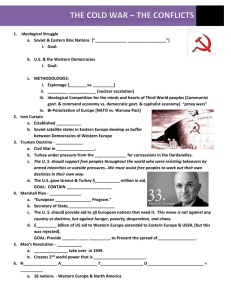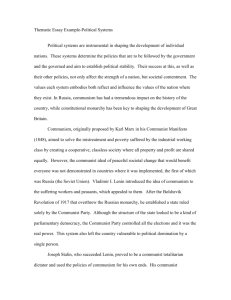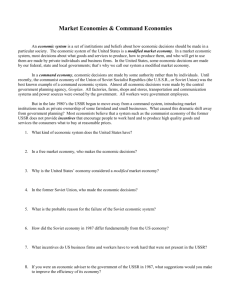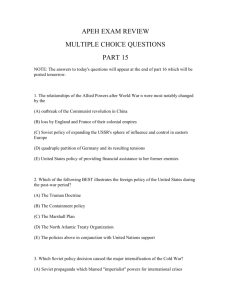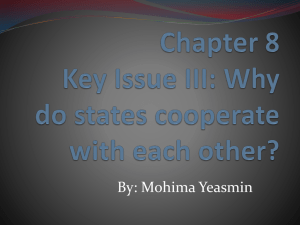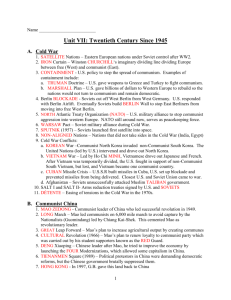AP Comparative Politics
advertisement
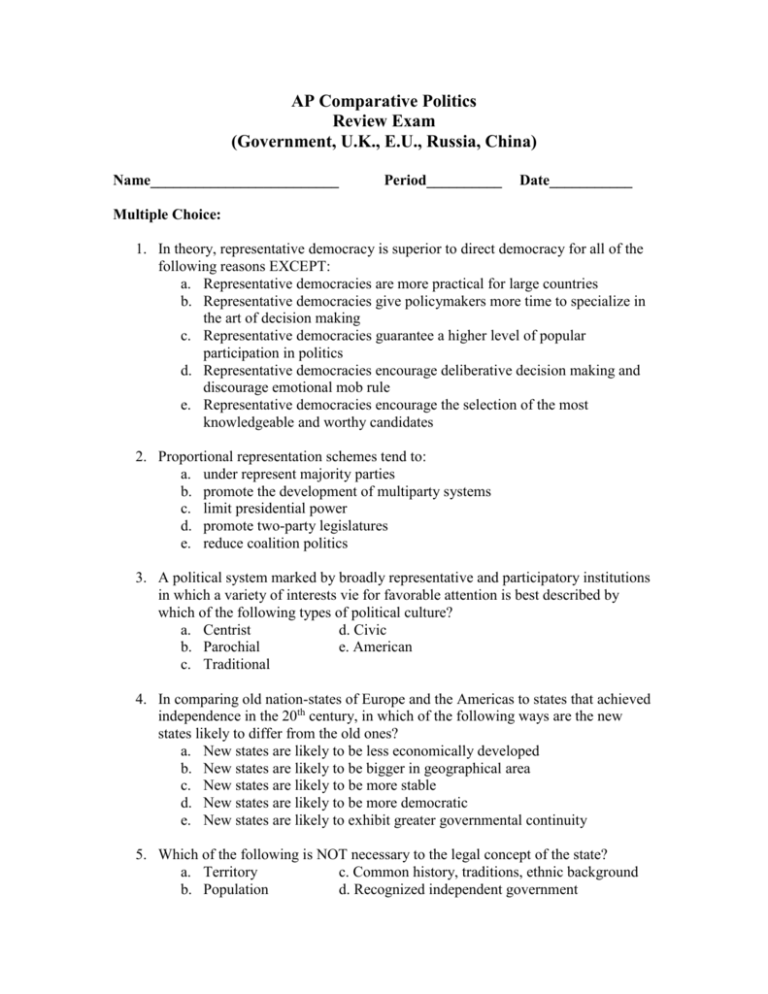
AP Comparative Politics Review Exam (Government, U.K., E.U., Russia, China) Name_________________________ Period__________ Date___________ Multiple Choice: 1. In theory, representative democracy is superior to direct democracy for all of the following reasons EXCEPT: a. Representative democracies are more practical for large countries b. Representative democracies give policymakers more time to specialize in the art of decision making c. Representative democracies guarantee a higher level of popular participation in politics d. Representative democracies encourage deliberative decision making and discourage emotional mob rule e. Representative democracies encourage the selection of the most knowledgeable and worthy candidates 2. Proportional representation schemes tend to: a. under represent majority parties b. promote the development of multiparty systems c. limit presidential power d. promote two-party legislatures e. reduce coalition politics 3. A political system marked by broadly representative and participatory institutions in which a variety of interests vie for favorable attention is best described by which of the following types of political culture? a. Centrist d. Civic b. Parochial e. American c. Traditional 4. In comparing old nation-states of Europe and the Americas to states that achieved independence in the 20th century, in which of the following ways are the new states likely to differ from the old ones? a. New states are likely to be less economically developed b. New states are likely to be bigger in geographical area c. New states are likely to be more stable d. New states are likely to be more democratic e. New states are likely to exhibit greater governmental continuity 5. Which of the following is NOT necessary to the legal concept of the state? a. Territory c. Common history, traditions, ethnic background b. Population d. Recognized independent government 6. Constitutions written in the 18th century differ from those written in the 20th century in which of the following ways? a. 18th century constitutions were preoccupied with declaring and specifying individual rights b. 18th century constitutions were less interested in establishing government machinery c. 18th century constitutions were more interested in consolidating central government control over the economy d. 20th century constitutions were less interested in government planning and social welfare policy e. 20th century constitutions were shorter, simpler statements of political philosophy 7. Democratic centralism as practiced by the former USSR meant that: a. elections would be held only for central government offices b. suggestions for policy might be made from the grass roots, but once decisions were made by higher authority, obedience was expected c. each socialistic republic could determine the means by which it centralized its work d. autonomous republics were free to hold democratic elections, so long as centralized administration was preserved e. the Russian Soviet Federated Socialist Republic, as the most democratic republic, would remain the center of power 8. Political culture in Great Britain is best described as: a. highly revolutionary d. consensual and evolutionary b. ideologically motivated e. radically democratic c. authoritarian 9. The effect of social class on voting behavior in Britain is best reflected in which of the following statements? a. A middle-class voter is more likely to vote Labour than a working-class voter b. The Labour party consistently wins control of Parliament because 50 percent of the British are working class c. Regardless of their actual class status, almost half of British voters view themselves as middle class, including workers who increasingly defect from the Labour party d. Upper income and upper-class elements are more heavily represented in the Labour party than the Conservative party e. Upward mobility predisposes the Asian immigrant classes in Britain to support the Conservative party 10. Which of the following is NOT true of the role of the opposition in the British parliament? a. It is organized to challenge the standing government’s policies b. c. d. e. It is representative of party followers throughout the country It is not permitted to publicly voice its criticism of majority party policy It provides the alternative government should the standing government fall It may seek to undermine the legitimacy of majority party policy through debates in the House of Commons 11. The prime minister in Great Britain is all of the following EXCEPT: a. leader of the majority party in Parliament b. leader of and representative of the British nation c. chair of the Cabinet d. chair of the House of Lords e. a major actor in foreign policy 12. Stalin’s efforts to ensure the success of “Socialism in One Country” led to a modernization policy based upon all of the following EXCEPT: a. priority was given to heavy industry in order to enhance the military capacity of the state b. agriculture was to be collectivized and mechanized c. excess urban labor was to be sent into rural areas to help operate collective farms d. education was centralized to ensure growth in the numbers of skilled workers and scientists e. persons who opposed modernization were considered enemies of the people and subject to execution, imprisonment, or banishment 13. The success of the Bolshevik Revolution under Lenin can be attributed to all of the following factors EXCEPT: a. no capitalist state made any effort to overthrow the Bolsheviks or to support their opposition b. Lenin promised peace to Russian soldiers who were increasingly disgruntled about Russia’s participation in WWI c. peasants were promised land by the Bolsheviks and were encouraged to expropriate it for themselves d. workers were promised bread and encouraged to engage in strikes e. the Bolsheviks deftly gained influence over local soviets in military units, villages, and cities to overthrow the Provisional Government 14. The political changes in the former Soviet Union before its collapse were attributable to all of the following EXCEPT: a. non-Russian ethnic resentment of Russian dominance and lingering sentiments of ethnic self-determination b. robust growth in Soviet trade with the West, which prompted rising economic growth and consumer expectations c. the debilitating economic effects of extensive Soviet military intervention throughout the world d. the realization by reformers, like Gorbachev, that socialist economic principles were stifling economic incentive and productivity e. the overbalance of expenditures on national security and under-investment in the consumer economy 15. The principal difference between a collective farm (kolkhoz) and a state-owned farm (sovkhoz) in the former Soviet Union was that: a. on the kolkhoz peasants owned no land and were paid by the state; on the sovkhoz, peasants could work their own land b. on the sovkhoz, unlike the kolkhoz, peasants could own their own garden plot c. the sovkhoz farms were much smaller than the kolkhoz farms and received less state support d. on the kolkhoz, peasants could own private garden plots; while on the sovkhoz, farmers were treated as salaried workers e. the kolkhoz was less productive and far more exploitative because peasants could hire out work at slave wages on their private plots 16. The reforms proposed by Soviet General Secretary Mikhail Gorbachev from 1985 to 1991 were designed to: a. end the political monopoly of the CPSU b. end the Cold War while maintaining the Soviet military presence in Eastern Europe c. bring a command economy and state socialism to the Soviet Union d. limit political repression and decentralize economic decision-making while maintaining the CPSU monopoly on political power e. break up the Soviet Union in favor of a more manageable, independent Russian Federation 17. The Mandate of Heaven concept in Chinese politics refers to: a. the People’s Liberation Army nuclear strategy b. the notion of divine support for imperial rule, which if withdrawn could justify revolt c. the Maoist policy of encouraging constant cultural revolution d. Deng Xiaoping’s economic modernization program e. the Communist party’s control over national elections 18. Mao’s legacy of Cultural Revolution in China has been repudiated in which of the following ways? a. The Gang of Four has been elevated to more important positions b. Red Guards now dominate Army c. The Communist Party has reasserted its control over politics d. Openness has given way to hyper-isolationism in global affairs e. Criticism and self-criticism is expected of party officials 19. Which of the following is NOT characteristic of the Communist party of China? a. The Standing Committee of the Politburo is the greatest influence in party decision making b. The basic unit of the party is the branch committee which provides surveillance over government officials at all levels c. The People’s Liberation Army is controlled by the party’s Military Affairs Commission d. The party is less powerful than the formal government apparatus e. The chairman of the Central Committee is the most prestigious office in the party organization 20. The concept of the mass line in Chinese political doctrine refers to: a. the effort by party officials to keep the masses in line b. the notion that party cadres must maintain close contact with common people and integrate mass public opinion into the policy-making process c. the effort by the party to ensure successful propaganda mechanisms to preserve a pliant population d. the need for continuous influence by the masses over the party through active recruitment of party members from the masses e. the reeducation campaign through which party leaders are made more sensitive to mass attitudes 21. Which of the following is NOT a fundamental tenet of Maoism? a. Conflict and disorder are to be valued, not abhorred. b. The human spirit conquers over matter and machines. c. The people should learn to be dependent on the state. d. Specialization and intellectualism is bad. e. Rural values are superior to the corrupt influences of urban life. 22. China and the former Soviet Union were similar in all of the following ways EXCEPT: a. both countries were dominated by communism for several decades b. both countries experienced relatively bloody revolutions c. leaders in both countries resorted to “cult of personality” tactics in order to consolidate national power d. the Communist party in both countries was dominated by workers e. the pre-revolutionary economies of both countries were largely agricultural and non-industrial in character 23. Which of the following factors distinguishes leadership in Communist systems, such as those which have existed in the former Soviet Union and China, from democratic systems such as those found in France and Great Britain? a. Leaders of communist systems do not have to balance competing interests, as do leaders of democratic systems b. Leadership transitions in communist systems are more uncertain and destabilizing than in Western democracies c. Leaders of communist systems are more likely to be recruited from the masses than in democratic systems d. Leaders of communist systems rely more heavily on the support of public opinion than do Western leaders e. Leadership in communist systems requires charismatic personalities, whereas this is not true of democratic systems 24. Which of the following distinguishes a communist political system from a pluralistic one? a. Pluralistic societies generally exhibit stronger and more inflexible central control of the economy. b. Communist systems are usually marked by more rapid and sustained economic growth c. Pluralistic systems tend to encourage less popular participation. d. Communist systems are inherently more stable. e. Change in communist systems is often more abrupt and violent. 25. In France, when the president and the prime minister come from different parties, the period of dual executive responsibility is referred to by which of the following terms? a. The rule of incompatibility d. Cohabitation b. Divided government e. Unconstitutionality c. Mixed government 26. As Prime Minister of Great Britain, Margaret Thatcher a. represented the Labour party b. supported British acceptance of monetary union with the European Communities c. favored broader constitutional rights for criminals and the accused d. favored a free market economy and private ownership of property e. favored extensive government spending and public welfare programs 27. In contrast to Joseph Stalin, Nikita Krushchev: a. aggressively pursued diplomatic ties with the Third World and initiated widespread foreign aid programs b. was principally concerned with consolidating the success of socialism in the Soviet Union c. refused to negotiate with Western leaders d. ruled with an iron fist and refused to tolerate disagreement with his policies e. abandoned efforts to counter the presence of NATO in Europe 28. The Labour party in Great Britain is characterized by all of the following EXCEPT: a. a tendency to split between left-wing extremist groups and a moderate center favoring gradualism b. strong support from union organizations c. consistent and unqualified support of British entry into and full participation in the European Common Market d. support for nationalization and public regulation of key industries e. support for progressive tax policy and universal social welfare services 29. Upward social mobility in the former Soviet Union was based principally upon which of the following factors? a. Non-Russians enjoyed a substantial advantage over Russians in upward social mobility b. Political loyalty to the Communist Party and/or technical competence c. Peasant and working class origins improved one’s chances for advancement because these groups are favored by communist ideology d. Nonpolitical careers guarantee higher status, but are open to fewer people e. Athletics provided the only significant alternative besides politics 30. The role of the monarch in the British political system is marked by all of the following EXCEPT: a. the right to open Parliament with a speech from the throne b. the right to invest the prime minister c. the only authority capable of dissolving Parliament d. the right to enact legislation approved by Parliament e. the right to veto legislation approved by Parliament 31. All of the following statements are true of Britain’s House of Lords EXCEPT: a. it has the power to delay money bills for a month b. it has the power to delay legislative proposals enacted by the House of Commons for a year c. after a year, the House of Lords may amend or veto proposals and return them to the House of Commons d. it is Britain’s final court of appeal e. it consists of hereditary peers as well as life peers appointed by the Crown 32. Prior to the recent collapse of the Soviet Union, the Supreme Soviet retained all of the following formal powers and functioning EXCEPT: a. amending the Constitution b. admission of new republics to the Soviet Union c. electing the general secretary of the Communist Party d. electing a Presidium to serve as a permanent organ of state power and a collective head of state e. forming a Council of Ministers to implement government policy 33. Deng Xiaoping’s policy approaches differed from those of Mao Zedong in all of the following ways EXCEPT: a. Deng accepted the need for concrete rewards to motivate the Chinese, rather than Mao’s emphasis on ideology b. Deng was willing to tolerate greater inequality than Mao in exchange for a higher degree of prosperity c. unlike Mao, Deng distributed intellectuals and preferred the peasant culture d. unlike Mao, Deng tolerated greater decentralization of economic planning e. Deng was more open to establishing and strengthening ties with foreign countries 34. The Four Modernizations campaign in China included all of the following EXCEPT: a. developing foreign aid policy d. developing the education system b. developing the agricultural sector e. developing national security c. developing the industrial sector 35. The “Red versus Expert” debate in China focused on the problem of: a. how to balance the need for quality education to achieve modernization with the goal of equal, mass education b. how to discourage ideological training for peasants c. how to reduce the technical training of Communists to ensure their ideological commitment d. how to reduce access to higher education in order to ensure that only a qualified elite could gain entrance e. how to get college graduates out of the Communist party 36. Which one of the following is most likely to exercise a great deal of influence within the Chinese political system? a. A vocal minority party, such as a student movement b. An independent local government, such as the mayor of Shanghai c. An independent judiciary, such as a judge in Beijing d. The military hierarchy, including top officers of the People’s Liberation Army e. The National People’s Congress 37. Legislative committees in Britain’s House of Commons: a. control the fate of government bills through the power of refusal to report them to the floor of the House b. consist of Standing Committees which may discuss and suggest amendments, and Select Committees which conduct ad-hoc investigations and hearings for the government c. take the first vote on bills submitted to the House of Commons d. are unimportant rubber stamps because they may not suggest substantive amendments to bills e. may consider bills only after the third reading on the floor of the House of Commons 38. In Great Britain, delegated legislation made by government agencies outnumbers regular acts of Parliament by twenty to one. Which of the following does NOT account for this? a. Parliament does not have enough time to enact detailed legislation b. Technical questions must often be ironed out after the passage of parliamentary acts c. Unforeseen contingencies often arise during the implementation of acts d. Emergencies often call for immediate administrative response e. Parliament prefers to minimize administrative flexibility 39. The Gang of Four in China were: a. the ministers in charge of the Four Modernizations b. long-time members of Deng Xiaoping’s inner circle c. radicals associated with the Cultural Revolution who were jailed and punished by Hua Guofeng after Mao’s death d. the Army officials responsible for the Tiananmen Square massacre e. liberal reformers who desired strong ties with the West 40. Leonid Brezhnev’s policies in the Soviet Union aimed at all of the following EXCEPT: a. achieving massive growth in Soviet military power b. giving priority to the consumer economy by increasing domestic production and consumption of consumer goods c. intervening, with military support, on behalf of Marxist regimes in the Third World d. pursuing arms control with the West without constraining Soviet military development e. seeking détente with the West to encourage greater commercial and trade ties, while expanding influence into the Third World Short-Answer Concepts: You should spend approximately 30 minutes on questions 1 through 5. 1. Identify three functions of political parties common to authoritarian and democratic systems. 2. Define devolution. Identify one institution created by devolution in the United Kingdom in the past ten years. 3. Identify two similarities in the goals of the Great Proletarian Cultural Revolution in China and the Cultural Revolution in Iran. 4. Describe one defining characteristic of a command economy and describe one defining characteristic of a market economy. Contrast these two characteristics. 5. Identify three different forms of political participation in authoritarian systems. Conceptual Analysis: You should spend approximately 30 minutes on question 6. 6. (a) Define bicameralism. (b) Identify one of the six countries covered in the AP Comparative Government and Politics course that has a bicameral national legislature. (c) Explain why a federal democracy is likely to have a bicameral national legislature. (d) Provide one other reason for a bicameral national legislature. (e) Describe two implications of federalism for the policy-making process. Country Context: You should spend approximately 20 minutes on question 7. 7. The referendum is a feature of democratic politics. (a) Define referendum and describe one advantage for a government of holding a referendum. (b) Identify the official who has the power to call a referendum in Great Britain. Describe one example of the use or proposed use of one specific national referendum in Great Britain. (c) Identify the official who has the power to call a referendum in Russia. Describe one example of the use or proposed use of one specific national referendum in Russia.
